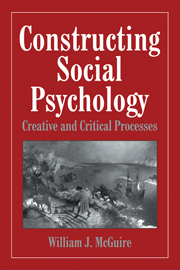Book contents
- Frontmatter
- Contents
- List of Tables and Figures
- Foreword
- 1 Learning My Way
- 2 Immunization against Persuasion
- 3 Attitude-Change Studies
- 4 Integrative Reviews of Social Influence Processes
- 5 Developing Effective Persuasion Campaigns
- 6 Thought Systems: Their Content, Structure, and Functioning
- 7 A Topography of the Phenomenal Self
- 8 Distinctiveness Theory and the Salience of Self-characteristics
- 9 Language and Thought Asymmetries
- 10 Psychology and History
- 11 Winters of Our Discontents: Crises in Social Psychology
- 12 A Perspectivist Epistemology: Knowledge as Misrepresentation
- Selected References
- Index
11 - Winters of Our Discontents: Crises in Social Psychology
Published online by Cambridge University Press: 05 October 2013
- Frontmatter
- Contents
- List of Tables and Figures
- Foreword
- 1 Learning My Way
- 2 Immunization against Persuasion
- 3 Attitude-Change Studies
- 4 Integrative Reviews of Social Influence Processes
- 5 Developing Effective Persuasion Campaigns
- 6 Thought Systems: Their Content, Structure, and Functioning
- 7 A Topography of the Phenomenal Self
- 8 Distinctiveness Theory and the Salience of Self-characteristics
- 9 Language and Thought Asymmetries
- 10 Psychology and History
- 11 Winters of Our Discontents: Crises in Social Psychology
- 12 A Perspectivist Epistemology: Knowledge as Misrepresentation
- Selected References
- Index
Summary
[Adapted with permission from McGuire, 1973c, The yin and yang of progress in social psychology: Seven Koan, Journal of Personality and Social Psychology, 26, pp. 446-56. Copyright © 1973 by the American Psychological Association.]
Dissatisfactions are frequently expressed regarding experimental social psychology's Establishment paradigm of testing theory-derived hypotheses by laboratory manipulational experiments. These dissatisfactions are not fully met by the suggested variant of doing field experiments. A more radical departure is needed that would investigate programmatically systems of variables rather than simplistic independent-dependent variable relations. On the conceptual side an adequate replacement would derive hypotheses from a systems theory of social or cognitive structures that takes into account multiple and bidirectional causal links among the variables. On the empirical side, the new paradigm should test hypotheses in multiexperimental programs of research using multivariate correlational designs with naturally fluctuating time-series variables. Some steps toward this needed paradigm were described (McGuire, 1973c) in the form of seven koan (the East Asian allusions reflecting this paper's having originated as an invited address at the Tokyo 20th Congress of Scientific Psychology in 1972).
A half-dozen years earlier, at the Moscow Congress, and even three years before, at the London 19th Congress, social psychology appeared to be in a golden age. It was a prestigious and productive area in which droves of bright young people, a sufficiency of middle-aged colonels, and a few grand old generals were pursuing their research with a confidence and energy found in those who know where they are going.
- Type
- Chapter
- Information
- Constructing Social PsychologyCreative and Critical Aspects, pp. 376 - 394Publisher: Cambridge University PressPrint publication year: 1999



